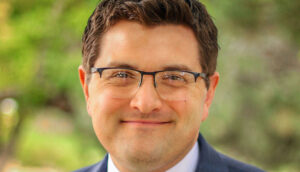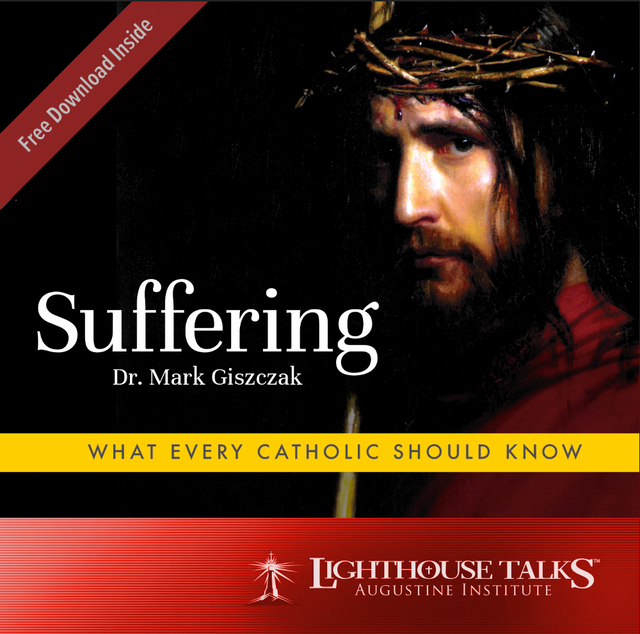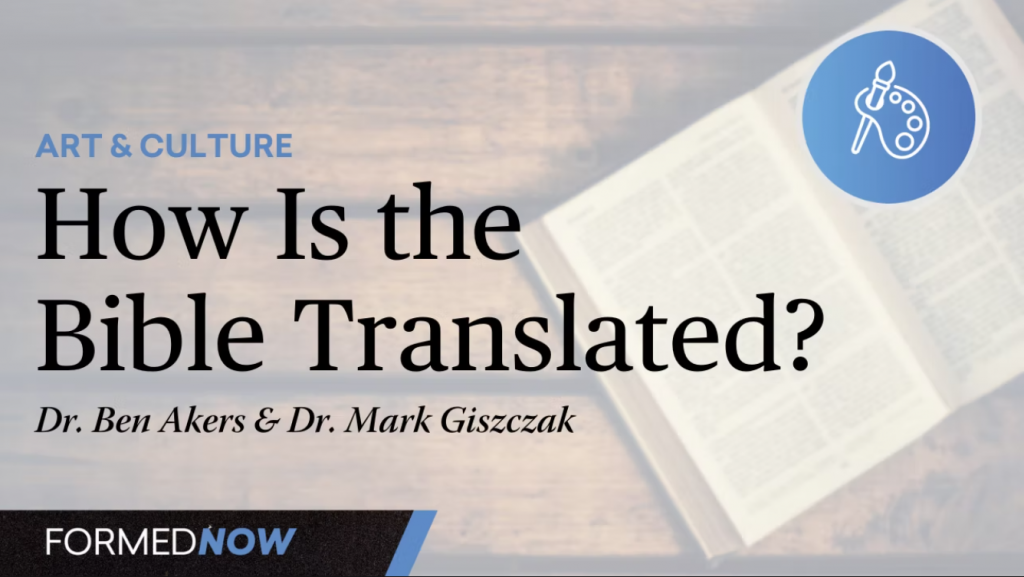This morning I was on Spirit Mornings from Spirit Catholic Radio talking about my new book – Suffering: What Every Catholic Should Know
Tag Archives: Interviews
Interview on Suffering with Church Life Today Podcast
I was recently interviewed by Leonard DeLorenzo on the Church Life Today Podcast regarding my new book on Suffering.
This is a summary of our conversation from their site:
Suffering is universal. But how do we understand suffering? Does it have meaning? Can it have meaning? And most of all, what is the meaning of suffering in Christian life? Questions like these inform the work of my guest today, Dr. Mark Giszczak, author of the new book Suffering: What Every Catholic Should Know. Dr. Giszczak is Professor of Sacred Scripture at the Augustine Institute Graduate School of Theology, where he teaches a course on the Theology of Suffering that gave rise to this new book. In our discussion today we will talk about whether and how God suffers, how Christians might suffer well, obstacles to suffering well, and the importance of confronting rather than perpetually running from death.
Here’s the link to the episode: https://churchlifetoday.osvpodcasts.com/2061699/14711091
Ignatius Press Podcast Interview on Suffering
Interviews on Wisdom and Suffering
Yesterday, I appeared on Catholic Faith Network, talking about my new commentary on Wisdom of Solomon (starting at 13:07):
CFN Live – March 7, 2024 from Catholic Faith Network on Vimeo.
I also appeared on the Busted Halo Show with Fr. Dave Dwyer talking about Suffering: What Every Catholic Should Know on SiriusXM: https://bustedhalo.com/radio-shows/thursday-march-7-2024
More Interviews on Suffering
- I did a written interview for Catholic World Report. Here’s an excerpt:
CWR: How did the book come about?
Mark Giszczak: This book started as a course I taught called “The Theology of Suffering.” Suffering, of course, is universal. Everybody suffers. But I was interested in working on this topic from a theological angle since I had seen that a little bit of theological thinking about it could go a long way.
So many professions–from medicine to psychology to entertainment–are dedicated to relieving suffering, but I wanted to explain what to do when all the therapeutic options have been exhausted. When my suffering cannot be taken away, what then?
CWR: The book is part of the What Every Catholic Should Know series. Why is suffering a topic that every Catholic should be educated in?
Giszczak: Everyone experiences sufferings, so everyone should know about it. Sadly, I think many people just try to avoid the topic, but life does not let us get off so easy. When we run from suffering, it will eventually chase us down and find us. So, if suffering is inevitable, then maybe we should look it in the face rather than run from it. Jesus even calls us to “take up our cross” and follow after him. But how? How do we do that? In this book, I try to explain how Christian life is truly “cross-shaped.” We are meant to experience both suffering and joy at the same time.
2. I was interviewed by Drew the Catholic (just yesterday!):
3. I appeared on the Cordial Catholic podcast in both audio and video formats:
4. I also laid down some audio tracks for the Amen App from the Augustine Institute (a free prayer app):
https://amenapp.org/prayer/ktgefha
Latest interview on Suffering
Today, I appeared on LA Catholic Mornings talking about my new book, Suffering: What Every Catholic Should Know. Check it out (my segment begins at timestamp 43:45):
Or you can watch the studio video here:
https://www.facebook.com/watch/?v=369562062528401
Recent Interviews: Catholic Theology Show; Drew Mariani Show
I’ve been doing some interviews on my new books. Take a listen:
The Catholic Theology Show with Michael Dauphinais
Little did I know some 20+ years ago that I would get interviewed by one of my professors! I took classes with Dr. Dauphinais in Ypsilanti, Michigan back at Ave Maria College (before the Florida campus was even purchased). I think he was 29 years old when he arrived as a professor fresh out of doctoral studies at Duke and I arrived as a freshman. I’m happy to find out that we’re still both on the same page–studying theology together. Very cool. We talk about the commentary and the Wisdom of Solomon in general, a terribly under-studied book of the Bible.
Drew Mariani Show
On Tuesday 2/6, I appeared on the Drew Mariani Show. He wanted to ask about recent archaeological finds that relate to the Bible and Christian settlement in the Holy Land. In particular, we talked about the recently found fifth century inscription mentioning “Christ, born of Mary” near Megiddo. It was a fun segment with a lot of topics and some speculation about what happened to the Ark of the Covenant. I hope you enjoy listing!
New Interview on Bible Translation
 I was just interviewed by Paloma Lopez Campos for Omnes Magazine, a Catholic outfit based in Spain. She asked me a lot about Bible translation and I did my best to answer. We talked about inclusive language, Liturgiam authenticam, dynamic equivalence, biblical vocabulary, the Septuagint, the text of the New Testament, the ancient manuscripts and how they were compiled, biblical ministries and how beginners can get started reading the Bible. Note that this interview was transcribed from an audio conversation. It tested the limits of my ability to speak in coherent paragraphs without grammatical errors! (You’ll notice a few.)
I was just interviewed by Paloma Lopez Campos for Omnes Magazine, a Catholic outfit based in Spain. She asked me a lot about Bible translation and I did my best to answer. We talked about inclusive language, Liturgiam authenticam, dynamic equivalence, biblical vocabulary, the Septuagint, the text of the New Testament, the ancient manuscripts and how they were compiled, biblical ministries and how beginners can get started reading the Bible. Note that this interview was transcribed from an audio conversation. It tested the limits of my ability to speak in coherent paragraphs without grammatical errors! (You’ll notice a few.)
Here’s an excerpt:
What is the biggest challenge now facing Bible translators?
– In my book on Bible translation I talk about the challenge of inclusive language, which has been a very important topic of discussion over the last fifty years. There has been a real shift in the way we think about men and women, about roles, and language has a lot to do with it.
In Bible translation, some translators have gone in the direction of trying to make the Bible as inclusive as possible. And others have taken a different, more conservative approach. They say we should make as many things as we can as inclusive as possible, but if the biblical text is gendered, then we should translate it as it is.
This becomes a kind of dialogue about the right way to translate. And I think as the conversation around genre continues to change, Bible translators will continue to have to reflect on the right approach.
On the one hand, there is a kind of tendency to yield to whatever the culture is doing at the time. On the other, there is a tendency to resist the culture. I think the right way to go is somewhere in between. Christian translators should resist the idea that contemporary culture can rewrite biblical anthropology. But, on the other hand, I think we must translate in a way that communicates with contemporary culture. (Read the rest…)
Talk on Suffering – CD and mp3
I am happy to announce the release of my latest audio talk on CD and mp3. It is entitled “Suffering: What Every Catholic Should Know“. It is available from the Augustine Institute for $4.50 for a CD and $3.49 for the mp3 download.
Tonight, June 12, 2023, I will be interviewed about this topic on Catholic Answers Live Radio show. I hope you can tune in to listen live or after the fact.
Suffering is a mystery: an unavoidable reality of human life on earth, which disorients us and tests our souls. It leads us to ask questions about God and his goodness. Though we seek pain relief and comfort, suffering cannot be solved by human effort. Instead, Jesus invites us, “If anyone would come after me, let him deny himself and take up his cross daily and follow me” (Luke 9:23). As we accept his call to self-denial, suffering can become redemptive, conforming us to Christ in his salvific suffering. This talk will explain Catholic teaching on the redemptive value of suffering and show how it can go from feeling useless to transforming us to be like God.
This talk is an appetizer for my forthcoming book, Suffering: What Every Catholic Should Know (Ignatius Press/Augustine Institute, 2023). Look for the book when it comes out later in 2023.
Video: How is the Bible Translated?
Here is a video interview I did with Dr. Ben Akers on Formed Now about how the Bible is translated. We talk about which bishops’ conferences are adopting the ESV Catholic Edition, the way in which Catholic Lectionaries are edited, the Vatican’s translation norms as represented in Liturgiam authenticam, what “essentially literal” translation means, dynamic equivalence, the tradition of English Bible translation, transparency to the original text, Isaiah’s prophecy of the virgin birth, the canon of biblical books, Tobit in the Nova Vulgata, the Protestant translators and Catholic reviewers of the ESV-CE. I hope you enjoy the conversation!


